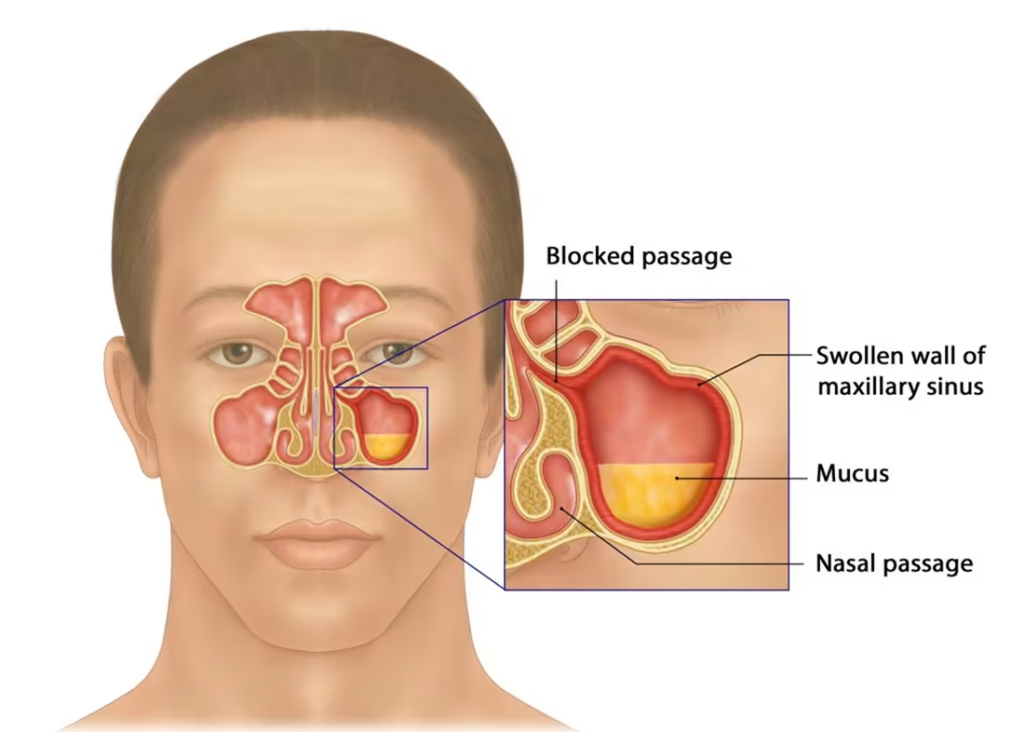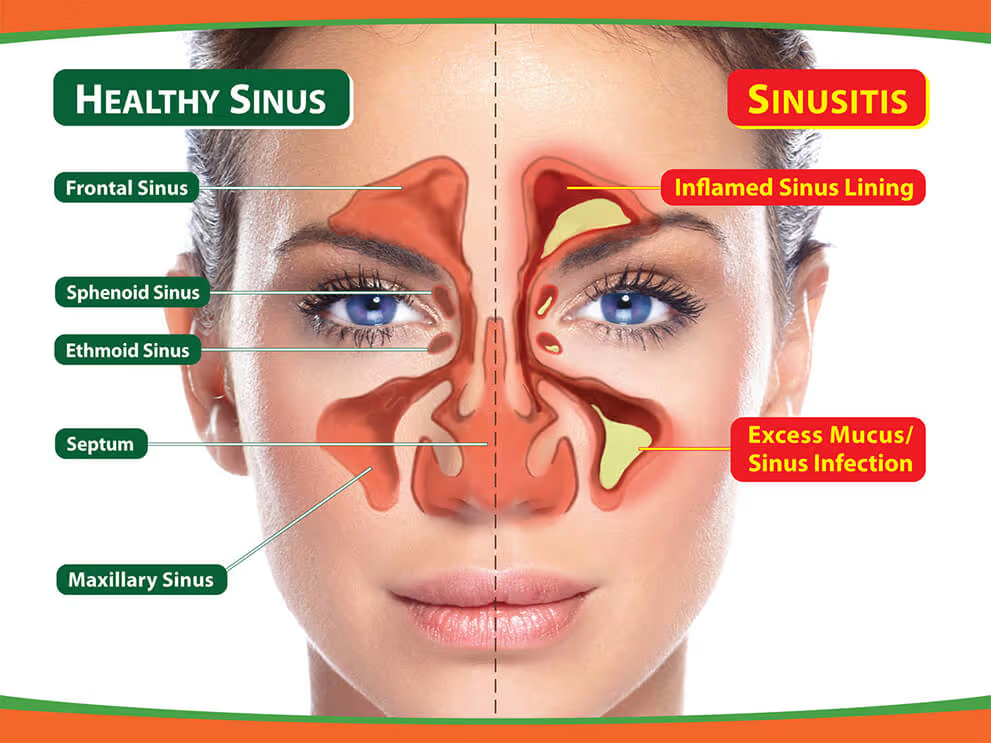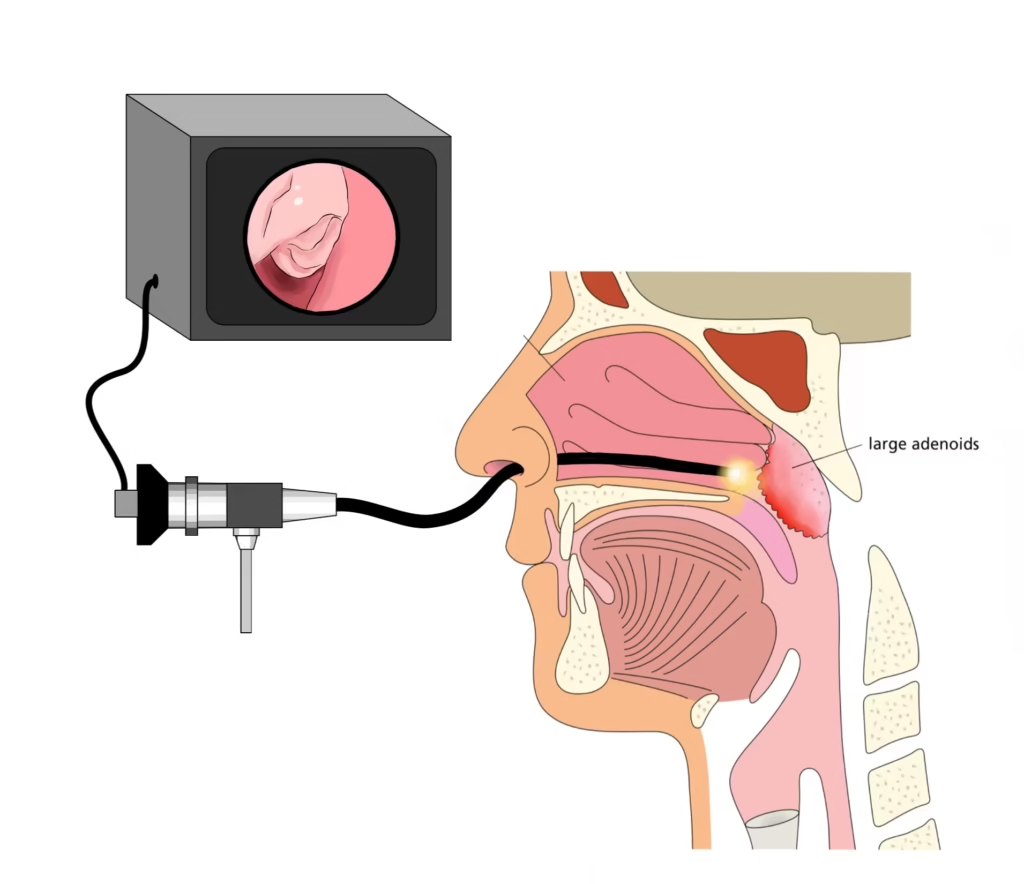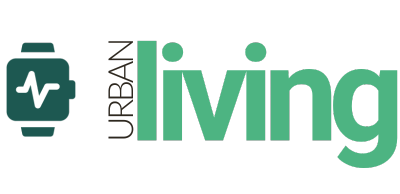Understanding Sinusitis

Sinusitis (also known as rhinosinusitis) is a condition where the lining of your sinuses becomes swollen and inflamed.
Chronic sinusitis is a long-term condition where the lining of your sinuses becomes swollen and inflamed.
Sinuses are naturally occurring air-filled spaces in the skull. Each sinus is covered with a mucosal covering.
The sinuses are all connected to the nose and mucus produced in the sinuses naturally drain out through the nose.
They help keep your nose moist and filter out pollutants. However, when sinuses become infected or blocked, it can impair mucus drainage and cause difficulty breathing through your nose.
The four sinuses we have are:

- Maxillary Sinus: Located below your eyes, also known as cheek sinus. This is also the biggest sinus cavity.
- Frontal Sinus: Located above your eyes
- Ethmoid Sinus: Located between your eyes
- Sphenoid Sinus: Located behind your eyes
When functioning properly, healthy sinuses drain mucus effectively, creating an airflow channel that reduces the accumulation of bacteria and other germs.
When sinuses become blocked and filled with fluid, germs can grow and cause an infection, resulting in sinusitis.
This might help: Which ENT Doctor in Singapore Should You Consider?
Types of Sinusitis
Sinusitis is classified into three main types based on duration and symptoms:
- Acute Sinusitis: This refers to the sudden onset of cold-like symptoms, such as a runny or stuffy nose, cough, and facial pain, that last for less than three months. Sinus treatments for acute conditions can include antibiotics and decongestants.
- Chronic Sinusitis: This refers to a condition that causes more serious symptoms, such as nasal congestion, facial pain or pressure, and decreased sense of smell, that last for more than three months. Sinus treatments for chronic sinusitis can include medications, immunotherapy, or surgery. Sinusitis is considered chronic when your symptoms last for 12 weeks or longer.
- Recurrent Acute Sinusitis: Four or more episodes of acute sinusitis in a year, and symptom-free and well between each episode.
Related article: TCM for Sinusitis and Allergic Rhinitis Treatment in Singapore
Causes of Sinusitis
Several factors can contribute to the development of sinusitis:
Structural Issues
Tissue growths also known as polyps can block your nasal passage or sinuses.
Deviated Septum:
It is a structural displacement of the nasal septum that can cause restriction or blockage of your sinus passage.
Inflammatory Conditions
Allergies: Inflammation caused by allergies or asthma can block sinuses.
Both chronic sinusitis and allergic rhinitis are closely related. Allergic rhinitis, which causes your nose to become swollen and inflamed, can potentially block the sinuses and lead to chronic sinusitis.
Infections
Respiratory Tract Infections: Respiratory tract infections caused by viruses or bacteria can cause your sinus membranes to be inflamed and block mucus drainage.
Viral infections such as the common cold or influenza can lead to inflammation of the sinus passages.
Bacterial infections, including Streptococcus pneumoniae, Haemophilus influenzae, and Staphylococcus aureus can infect the sinuses.
Other Medical Conditions
Other Medical Conditions: Conditions such as cystic fibrosis, HIV, and other immune system-related diseases can lead to chronic sinusitis.
Symptoms of Sinusitis
The common signs and symptoms of sinusitis include:
- Thick, yellow or green nasal discharge
- Congested or stuffy nose
- Mucus dripping down the back of your throat (post-nasal drip)
- Pain or tenderness around your eyes, nose, and forehead
- Reduced sense of smell and taste
- Bad breath
- Headache
- Tooth pain
Pain and Discomfort: Sinusitis often causes facial pain and pressure, particularly around the forehead, cheeks, and eyes. This discomfort can range from mild to severe and may be accompanied by headaches.
Difficulty Breathing: Inflamed and congested sinuses can lead to difficulty breathing through the nose. This can result in mouth breathing, snoring, and disrupted sleep patterns.
Diagnosis of Sinusitis
During a physical examination, the doctor will check for tenderness in your nose and face, in addition to any swelling inside your nose.
Besides noting your symptoms and medical history, doctors may perform the following diagnostic procedures:
Nasoendoscopy

Endoscopy: The doctor will insert a thin, flexible tube with a fibre-optic light to check the insides of your nose and sinuses.
Imaging Tests
Imaging Tests: MRI or CT scan can detect any structural issues or blockage caused by a deviated septum, polyps, or tumours through images of your nasal area.
Additional Testing
Allergy Tests: An allergy skin test can help detect the allergens that may be triggering your chronic sinusitis.
Sinus and nasal culture: Your doctor may also collect tissue samples or cultures from the inside of your nose or sinuses, and send them to the laboratory to identify bacterial or fungal infections.
Further information on the bacteria or fungi’s antibiotic sensitivity and resistance profile can help guide antibiotic treatment.
Treatment Options for Sinusitis in Singapore
Treatment for sinusitis varies depending on the cause, type, and severity of the condition. Here are the main treatment approaches:
Non-Surgical Treatments
Medications
Non-steroidal anti-inflammatory drugs such as ibuprofen and acetaminophen can help relieve symptoms.
If your chronic sinusitis is triggered by an allergy, medications such as antihistamines can alleviate allergy symptoms.
For bacterial sinus infections, antibiotics may help eliminate the infection and prevent further complications.
Nasal Corticosteroids
Decongestants or steroid nasal sprays can treat inflammation and reduce the amount of mucus in sinuses.
For severe chronic sinusitis, oral corticosteroids may be effective but can cause serious side effects in the long run.
Immunotherapy
Allergy shots are a long-term treatment option for allergy-related sinusitis to help reduce the body’s reaction to the allergen.
Home Remedies
- Place a warm compress or towel over your nose or forehead to ease the pressure in your sinuses.
- Use a saline solution to lubricate your nasal passage and drain out mucus.
- Drink plenty of fluids to thin the mucus and reduce sinus blockage.
- Get sufficient rest for a faster recovery.
Surgical Treatments
Surgery is an option for those who do not respond well to medications or other treatments.
Endoscopic Sinus Surgery (FESS)
Endoscopic Sinus Surgery: The doctor will insert an endoscopy tube into your nose and remove polyps or mucus that may be blocking your nasal passage.
For patients with sinusitis who do not respond to comprehensive medical treatment, functional endoscopic sinus surgery (FESS) may be recommended.
FESS is a minimally invasive procedure performed internally through the nostrils, eliminating the need for external incisions on the nose or face.
The utilisation of an image guidance system (IGS) during the surgery significantly lowers the risk of major complications.
Deviated Septum Surgery (Septoplasty)
Deviated Septum Surgery (Septoplasty): This surgery helps to adjust or enlarge the wall between your nostrils to help improve your breathing.
Balloon Sinuplasty
Balloon sinuplasty – Less invasive than FESS, this procedure uses specialised instruments to insert a balloon and dilate the sinus opening.
The treatment aims to restore normal mucus flow in the sinuses without tissue or bone removal.
Safety of Sinus Surgery
Sinus surgery, especially when utilising the minimally invasive approach of FESS, is widely recognised for its safety and effectiveness. However, like all surgical procedures, there are potential risks to be aware of:
Bleeding: As with any surgical procedure, there is a potential risk of bleeding during or after sinus surgery. However, the risk is typically low, and surgeons take meticulous steps to minimise this possibility.
Infection: Post-surgical infections are a risk in any operation, including sinus surgery. Strict sterile techniques and sometimes preventive antibiotics are used to reduce this risk.
Adverse reactions to anaesthesia: Some patients may experience reactions to anaesthesia, though careful preoperative assessment aims to minimise this risk.
Damage to surrounding structures: The sinuses are located close to the eyes, brain, and major nerves, posing a risk of injury during surgery.
The use of IGS during FESS has greatly reduced this risk by allowing surgeons to navigate more safely around these critical structures.
Cerebrospinal fluid (CSF) leak: Although rare, there is a risk of creating a leak of CSF, the fluid surrounding the brain, especially in surgeries involving the sphenoid or ethmoid sinuses.
The use of IGS technology and the expertise of the surgeon significantly lower this risk.
Recovery Process After Sinus Surgery
Recovery after sinus surgery can vary, but it typically involves some post-operative discomfort, swelling, mild bleeding and congestion. Most can return to normal activities within a week, but full recovery may take a few weeks.
Post-operative care is crucial for optimal recovery:
- Rest adequately and consider lying on your side or using a pillow for better breathing.
- Drink plenty of fluids and sip hot water
- Apply moist heat with a warm, wet towel on the face or inhale steam to relieve sinus pressure and open sinus passages.
- Be cautious with over-the-counter cold medications, as they can exacerbate symptoms or cause other issues. Consult your doctor before use.
When to See an ENT Specialist in Singapore
You should consider consulting with an ENT sinus specialist in Singapore under the following circumstances:
- Persistent sinusitis symptoms that last more than 12 weeks despite medical treatment
- Recurrent sinus infections throughout the year
- Symptoms of sinusitis coupled with severe headache, facial pain, or vision problems
- Difficulty breathing through the nose is not alleviated by over-the-counter medications
- Suspected sinus-related snoring or sleep apnea
Potential Complications of Untreated Sinusitis
Reduced Quality of Life: Chronic sinusitis can lead to persistent symptoms, which may affect an individual’s daily life.
These symptoms can include fatigue, reduced productivity, and a decreased overall quality of life.
Although symptoms of sinusitis can be very troubling, severe complications of sinusitis are rare.
These include meningitis/cerebral abscess (spread of sinus infections into the brain lining with pus collection in the brain), osteomyelitis (sinusitis spreading into surrounding bone) and orbital abscess (pus collection within the eye).
Sinusitis can also exacerbate pre-existing upper and lower respiratory conditions such as allergic rhinitis and asthma.
Prevention of Sinusitis
To reduce the risk of developing sinusitis:
- Avoid allergens if you have allergies
- Practice good hand hygiene to prevent respiratory infections
- Stay hydrated to maintain thin mucus
- Use a humidifier in dry environments
- Avoid smoking and exposure to secondhand smoke
- Manage stress, as it can weaken your immune system
Frequently Asked Questions
What is the difference between sinusitis and a common cold?
A ‘cold’ from a simple viral infection is usually self-limiting and resolves within a week.
Sinusitis symptoms, while they may be similar to a cold in some aspects such as having running nose and nasal congestion, may last for four weeks or more.
Can sinusitis clear up without treatment?
Most cases of sinusitis can be treated with nasal sprays, rinses and supportive care.
However, if symptoms worsen or do not resolve, further medical treatment and tests may be warranted.
How can I relieve sinus congestion at home?
You can try over-the-counter saline nasal sprays, steam inhalation, warm compresses, staying hydrated, and getting plenty of rest to help relieve sinus congestion. If symptoms persist, it is recommended to visit a doctor.
When should I consider sinus surgery?
Sinus surgery may be considered if you have chronic sinusitis that does not respond to conservative treatments, if there are structural abnormalities blocking sinus passages, or if you experience recurrent sinus infections despite medical management.
What types of sinus surgeries are available in Singapore?
There are several types of sinus surgeries in Singapore, including endoscopic sinus surgery (ESS), functional endoscopic sinus surgery (FESS), and balloon sinuplasty.
The specific procedure recommended will depend on your individual condition and needs.
Does stress or cold weather trigger sinusitis?
Stress and anxiety can weaken your body’s immune system, which can indirectly trigger sinusitis. Sinusitis also tends to be more prevalent during cold weather as the dry air breaks down your body’s natural barrier and increase your susceptibility to viruses.
What medical insurance options are available for sinusitis treatment in Singapore?
In Singapore, there are several convenient payment and insurance options available for sinusitis treatment.
Patients can pay using cash for immediate transactions, or they can use NETS for electronic payments.
Modern digital payment methods are also accepted, including PayNow and PayLah for quick and convenient transfers.
Additionally, all major credit cards are accepted, providing flexibility for patients who prefer to use their preferred credit card for medical expenses.
Medisave Coverage
All Singaporeans and Permanent Residents are able to use their Medisave accounts for certain consultations, procedures, and medications at participating clinics.
This government-managed healthcare savings scheme helps reduce out-of-pocket expenses for eligible medical treatments and provides an important financial resource for managing healthcare costs related to sinusitis treatment.
Approved Integrated Shield Insurers
There are six approved Integrated Shield Insurers that provide coverage for medical treatments in Singapore.
NTUC Income offers both IncomeShield and Enhanced IncomeShield plans for comprehensive medical coverage.
American International Assurance International Co. (AIA) provides HealthShield Gold as their integrated shield option.
Great Eastern Life Assurance Company offers two plan options: SupremeHealth and SupremeHealth Plus, catering to different coverage needs.
Aviva Ltd. provides MyShield as their integrated shield plan, while Prudential Assurance Company offers PRUShield for medical coverage.
Finally, AXA provides AXA Shield as their integrated shield insurance option, completing the list of approved insurers that patients can use for their sinusitis treatment coverage.
What should I expect during my first ENT specialist visit?
Your ENT doctor will first take a look at your medical history, find out more about the symptoms you’re experiencing and thereafter perform a thorough physical examination.
This may include certain procedures such as flexible nasoendoscopy (a look into your nasal passages with a tiny camera).
Your issues will be addressed and a suitable treatment plan will be devised for you.
How can I prepare my child for their first ENT visit?
Always talk to your child to prepare them for their ENT visit. Find out more about the issues they’re experiencing so that you can assist them in helping the ENT doctor understand their condition. Do bring along a list of their old medications and health booklet.
By understanding sinusitis and its treatment options, you can make informed decisions about your healthcare and find the most effective solutions for managing this condition in Singapore.

